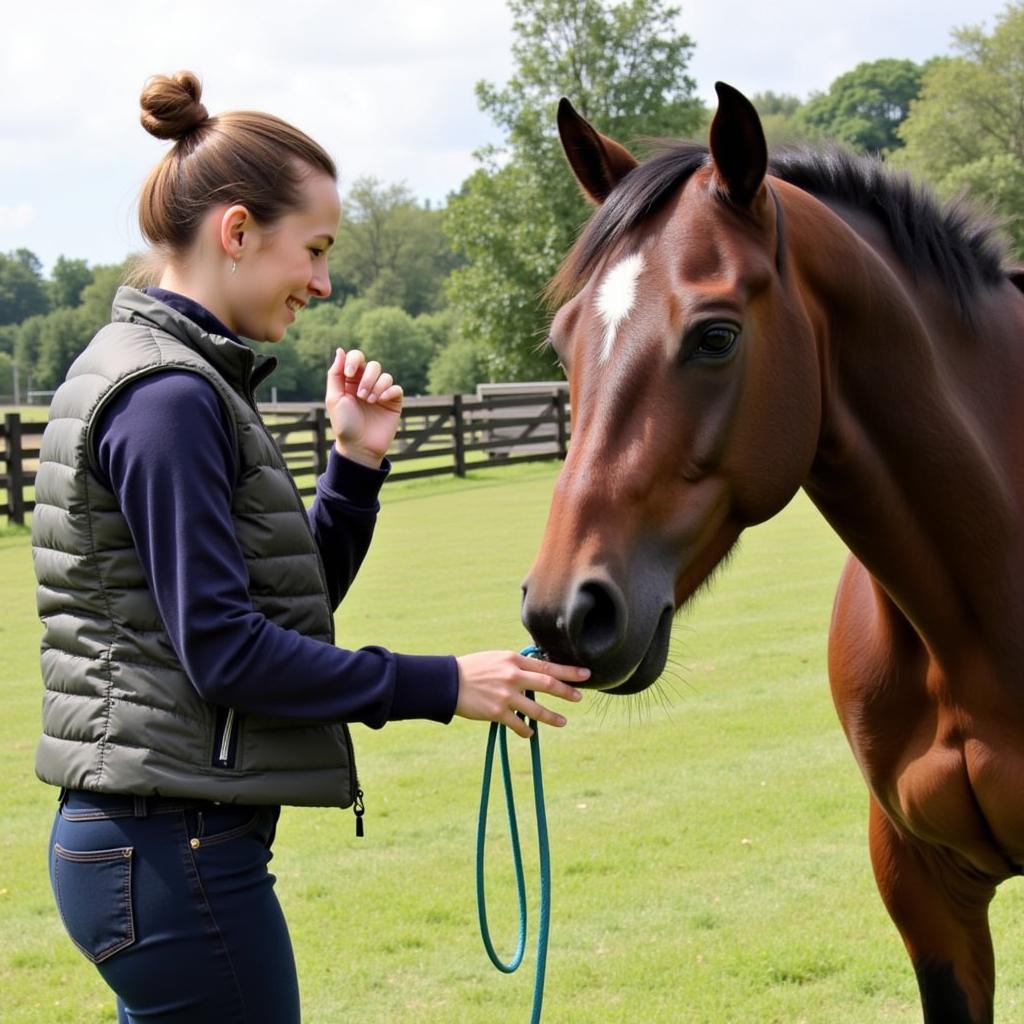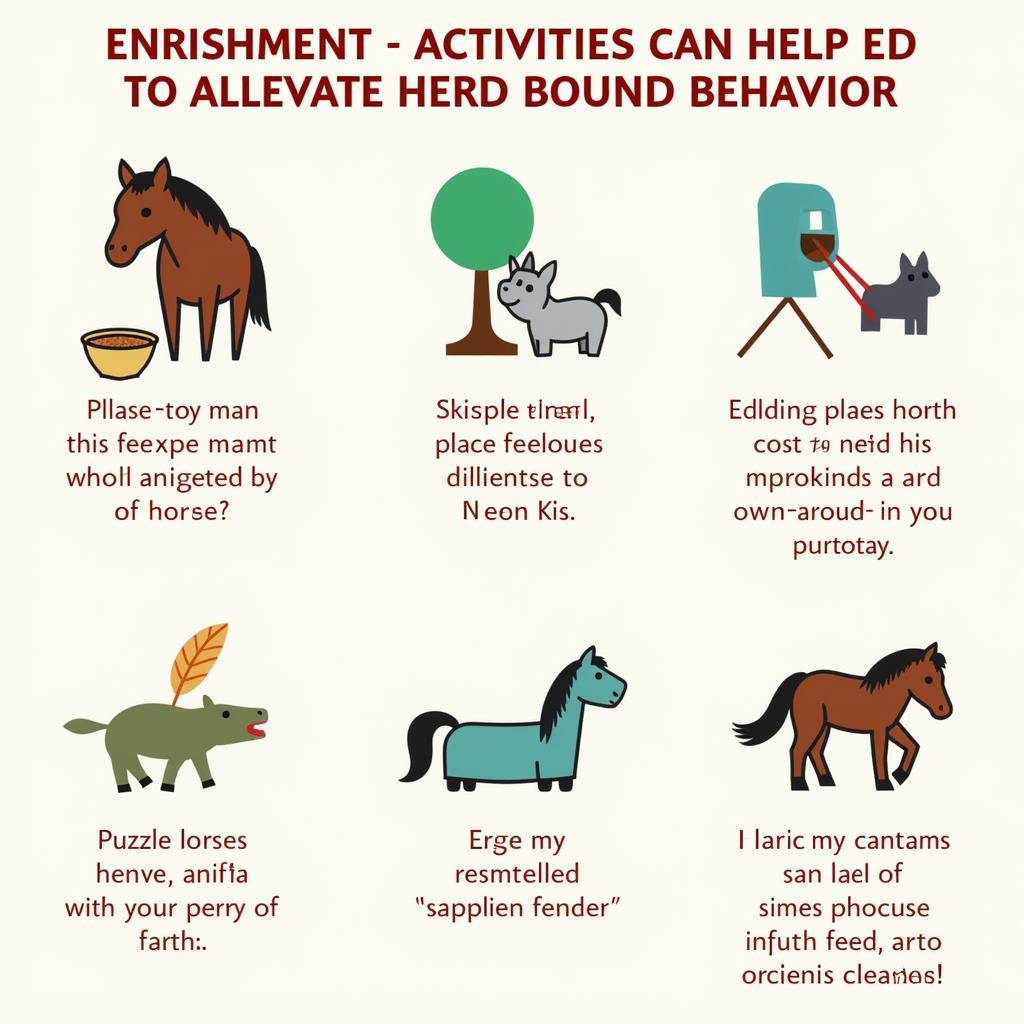Herd Bound Horses are a common sight in the equine world, often exhibiting strong attachments to their companions. This behavior, while seemingly endearing, can pose challenges for horse owners. This comprehensive guide will delve into the intricacies of herd bound horses, explore the reasons behind this behavior, and provide practical tips for managing and overcoming herd separation anxiety.
What is a Herd Bound Horse?
A herd bound horse is a horse that displays intense anxiety and distress when separated from its herd mates. This separation anxiety can manifest in various ways, including:
- Excessive vocalization: Neighing, whinnying, or calling out constantly.
- Restlessness and pacing: Walking around the stall or paddock, constantly searching for their companions.
- Destructive behavior: Kicking, biting, or chewing at stall doors or fences.
- Refusal to eat or drink: Loss of appetite due to stress.
- Increased heart rate and respiration: Physiological signs of anxiety.
Why are Horses Herd Bound?
Horses are naturally social animals who thrive in a herd environment. They rely on their companions for:
- Safety and security: The herd provides a sense of protection from predators and other dangers.
- Social interaction: Horses engage in complex social interactions, including grooming, playing, and sharing food.
- Emotional support: Herd mates provide a sense of comfort and companionship.
Being separated from their herd disrupts these essential social bonds, triggering a range of anxiety-related behaviors.
Recognizing the Signs of Herd Bound Behavior
Here are some telltale signs that your horse may be herd bound:
- Visible distress when separated: Whinnying, pacing, or showing signs of agitation.
- Increased vigilance: Looking around frequently and appearing on edge.
- Changes in appetite or sleep patterns: Loss of appetite, difficulty sleeping, or restless behavior.
- Exaggerated reactions: Overly sensitive to noise or other disturbances.
Managing Herd Bound Behavior: Practical Tips
Managing herd bound behavior requires a combination of patience, understanding, and practical strategies:
- Gradual separation: Instead of abruptly separating your horse, gradually introduce them to being alone for short periods.
- Enrichment activities: Provide toys, puzzles, and interactive feeders to keep your horse mentally and physically engaged.
- Socialization: Introduce your horse to other friendly horses, but ensure they are compatible and safe.
- Positive reinforcement: Reward calm and relaxed behavior with treats, praise, and gentle grooming.
Expert Insights on Herd Bound Horses
“It’s crucial to recognize that herd bound behavior is a natural response to the horse’s social needs,” says Dr. Emily Carter, a renowned equine behaviorist. “Understanding these instincts is key to providing appropriate management and enrichment.”
“Creating a safe and comfortable environment that promotes a sense of security can significantly alleviate herd bound behavior,” adds Mark Thompson, a seasoned horse trainer. “This includes providing adequate space, access to fresh water and food, and consistent routines.”
Frequently Asked Questions
Q: How long does it take for a herd bound horse to adjust to being alone?
A: It varies depending on the horse’s individual personality and history. Some horses may adapt quickly, while others may take weeks or even months.
Q: What are some signs that my horse is becoming too stressed?
A: Excessive vocalization, destructive behavior, refusal to eat or drink, or changes in respiration are all signs of severe stress.
Q: Can herd bound behavior be cured?
A: While herd bound behavior cannot always be “cured,” it can be managed with appropriate strategies and training.
In Conclusion
Herd bound horses are simply exhibiting their natural instincts as social creatures. Understanding their needs and implementing practical strategies can help alleviate their anxiety and promote a more harmonious relationship between you and your equine companion. Remember, patience and understanding are key to helping your horse thrive in any environment.



If you have any further questions or need assistance managing your herd bound horse, please don’t hesitate to contact us! We are here to provide you with personalized support and guidance.
Phone Number: 0772127271
Email: [email protected]
Address: QGM2+WX2, Vị Trung, Vị Thuỷ, Hậu Giang, Việt Nam.
We are committed to helping you build a strong and positive bond with your horse.